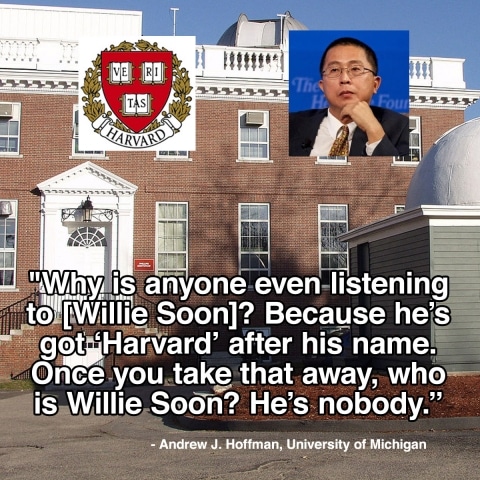Both Harvard and the Smithsonian Institute are trying to shake off the controversy surrounding Willie Soon, but these esteemed organizations should not be let off the hook easily.
Earlier this week, documents revealed by the Guardian and New York Times provide irefutable evidence that climate denier Willie Soon and the Harvard-Smithsonian Center for Astrophyics received more than $1 million in funding from fossil fuel companies to deliver scientific reports that called into question the scientific conclusion that climate change is the result of burning too much oil, coal and other carbon-emitting fuel sources.
Harvard quickly tried to distance themselves from the Soon scandal telling the Guardian that “Soon operated outside of the university.” This, despite the fact that Soon “carries a Harvard ID and uses a Harvard email address.”
The Smithsonian Institute also reacted quickly announcing that they have tasked their Inspector General to look into the ethical conduct of Dr. Soon.
“The Smithsonian is greatly concerned about the allegations surrounding Dr. Willie Soon’s failure to disclose funding sources for his climate change research,” they said in a statement shortly after the scandal broke over the weekend.
But who is going to probe the ethical conduct of the Harvard-Smithsonian Center for Astrophysics?
After all, many of the documents include the organization’s letterhead. Take for example this funding request to oil giant ExxonMobil to produce a paper on the understanding of solar variability and climate change:
The response email regarding this proposal is not from Willie Soon personally, but from someone working in the Advancement and External Affairs department at the Harvard-Smithsonian Center for Astrophysics.
Clearly there is more at play here than a rogue scientist.
And the Smithsonian didn’t just act as a go-between for Soon and Exxon, they recieved a large chunk of the cash themselves.
In a just-released 2012 exclusive interview with Willie Soon by DeSmog UK‘s editor Brendan Montague, Soon explains how he solicited ExxonMobil funding for his work:
“Every time I applied [to ExxonMobil], every year I try to get something. Mostly what I get was in the range of $50k to $60k a year at the most. It’s a small amount — because a large part of it goes on overheads.”
That “large part” of the ExxonMobil funding went to the Harvard-Smithsonian. In fact, another document is a conversation between Harvard-Smithsonian employees looking to reclassify ExxonMobil funds to “defray any shortfall in development funding.”
Clearly these are funds being directed to the Harvard-Smithsonian’s general coffers and not Willie Soon. The Smithsonian’s Inspector General confirmed as much in an interview with the Chronicle of Higher Education this week, saying that:
“… under standard observatory procedures, less than half of that amount was passed through to Mr. Soon as salary. Most was kept by the Smithsonian to cover facility operating costs.”
In that very same Chronicle of Higher Education article, University of Michigan professor Andrew J. Hoffman summed up what I believe to be at the very heart of the Soon scandal. As Dr. Hoffman puts it:
“The roles played by both Harvard and the Smithsonian in burnishing Mr. Soon’s credentials and scientific authority are key to Mr. Soon’s saga. Why is anyone even listening to him?” Mr. Hoffman said of Mr. Soon. “Because he’s got ‘Harvard’ after his name. Once you take that away, who is Willie Soon? He’s nobody.”
In other words, if you don’t have a Harvard email address, the liklihood of garnering much attention from decision-makers, media and the like goes down by a factor of somewhere very close to 100%.
Anyone working in politics or public relations knows that the “medium is the message” – it is as much about what is being said, as it is who is saying it. Like it or not, Soon as a Harvard-Smithsonian academic — with a Harvard email address — has outsized weight in the public discourse on the issue of climate change. Soon with a Google email address has no weight at all.
As for the fossil fuel funding at the center of this scandal, Willie Soon without Harvard and the Smithsonian is of no use to fossil fuel companies looking to muddy the scientific realities of climate change to delay action that will affect their profits.
And in turn Willie Soon, without bringing along the big bucks of fossil fuel companies, is likely of little use to the Harvard-Smithsonian Center for Astrophysics.
Subscribe to our newsletter
Stay up to date with DeSmog news and alerts







